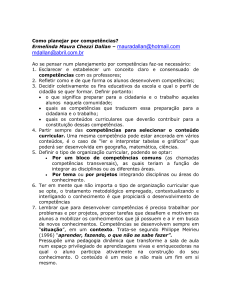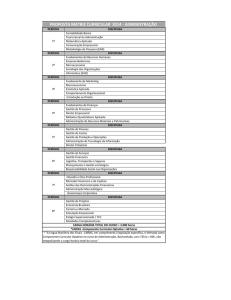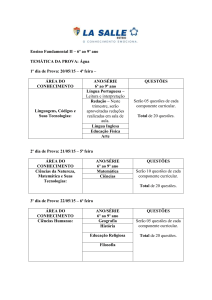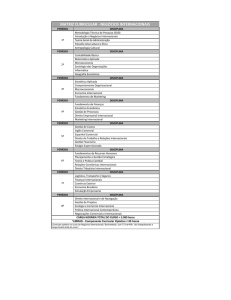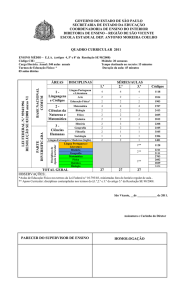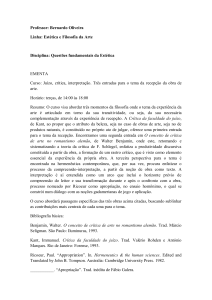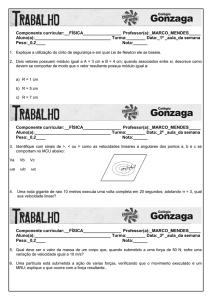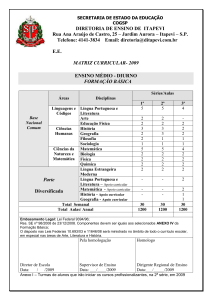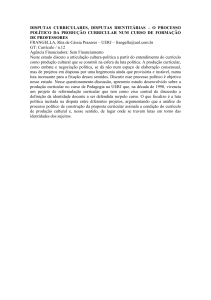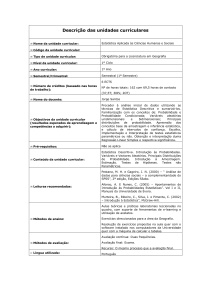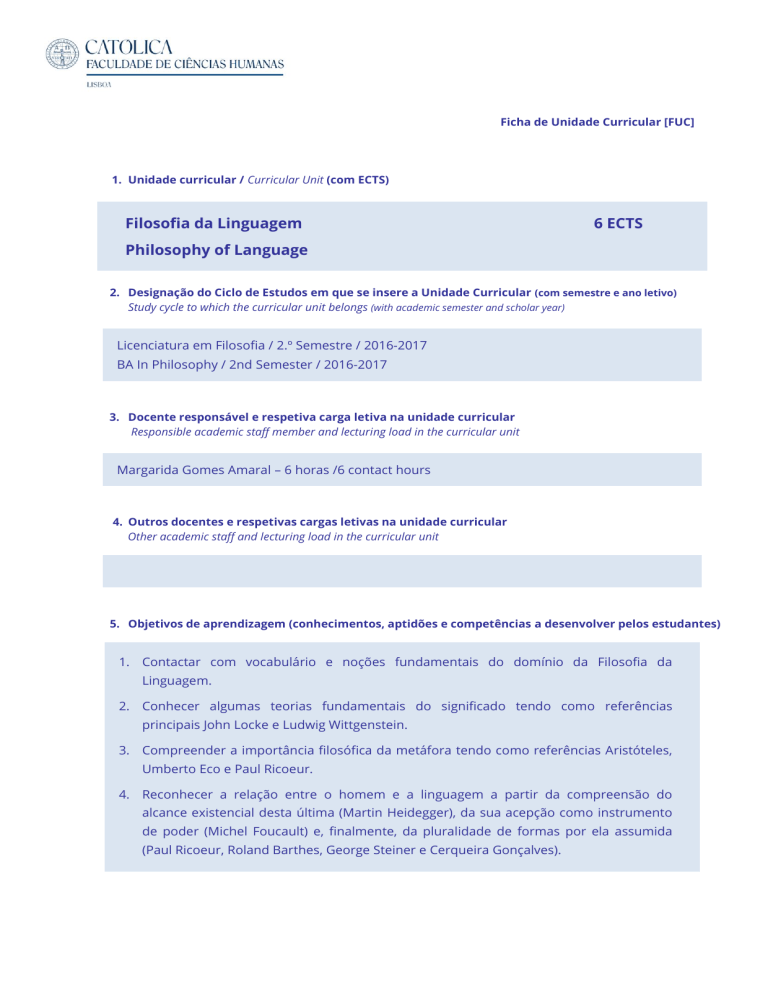
Ficha de Unidade Curricular [FUC]
1. Unidade curricular / Curricular Unit (com ECTS)
Filosofia da Linguagem
6 ECTS
Philosophy of Language
2. Designação do Ciclo de Estudos em que se insere a Unidade Curricular (com semestre e ano letivo)
Study cycle to which the curricular unit belongs (with academic semester and scholar year)
Licenciatura em Filosofia / 2.º Semestre / 2016-2017
BA In Philosophy / 2nd Semester / 2016-2017
3. Docente responsável e respetiva carga letiva na unidade curricular
Responsible academic staff member and lecturing load in the curricular unit
Margarida Gomes Amaral – 6 horas /6 contact hours
4. Outros docentes e respetivas cargas letivas na unidade curricular
Other academic staff and lecturing load in the curricular unit
5. Objetivos de aprendizagem (conhecimentos, aptidões e competências a desenvolver pelos estudantes)
1. Contactar com vocabulário e noções fundamentais do domínio da Filosofia da
Linguagem.
2. Conhecer algumas teorias fundamentais do significado tendo como referências
principais John Locke e Ludwig Wittgenstein.
3. Compreender a importância filosófica da metáfora tendo como referências Aristóteles,
Umberto Eco e Paul Ricoeur.
4. Reconhecer a relação entre o homem e a linguagem a partir da compreensão do
alcance existencial desta última (Martin Heidegger), da sua acepção como instrumento
de poder (Michel Foucault) e, finalmente, da pluralidade de formas por ela assumida
(Paul Ricoeur, Roland Barthes, George Steiner e Cerqueira Gonçalves).
Learning outcomes of the curricular unit
1. To enter into contact with the basic vocabulary and notions of the Philosophy of
Language field.
2. To acquire some fundamental theories of meaning, with John Locke and Ludwig
Wittgenstein as the core references.
3. To understand the philosophical importance of the metaphor taking Aristotle, Umberto
Eco and Paul Ricoeur as the references.
4. To recognize the relationship between man and language, from understanding the
existential scope of language (Martin Heidegger), its meaning as an instrument of power
(Michel Foucault), and, finally, to the plurality of forms it assumes (Paul Ricoeur, Roland
Barthes, George Steiner and Cerqueira Gonçalves).
6. Conteúdos programáticos
I – Introdução à Filosofia da Linguagem
1. Vocabulário
fundamental
–
significado,
referência,
compreensão,
sentido,
comunicação, pragmática, representação.
2. Noções fundamentais – linguagem e pensamento; o ser homem, a linguagem, o
mundo e os outros.
II – Algumas teorias do significado
1. A teoria ideacional do significado.
2. A teoria do significado como uso.
III – O significado não literal: a metáfora
1. Aristóteles: “Transportar para uma coisa o nome de outra”.
2. Umberto Eco: “O nó metafórico”.
3. Paul Ricoeur: O “poema em miniatura”.
IV – A relação entre o homem e a linguagem
1. Linguagem e existência.
2. Linguagem e poder.
3. Fala, escrita e outras linguagens.
4. Linguagem e filosofia.
Syllabus
I – Introduction to the Philosophy of Language
1. Basic vocabulary – meaning, reference, understanding, sense, communication,
pragmatics, representation.
2. Basic notions – language and thought; the man, the language, the world and the
others.
II – Some theories of meaning
1. The ideational theory of meaning.
2. The theory of meaning as use.
III – The non-literal meaning: the metaphor
1. Aristotle: "Transfer to one thing a name that belongs to something else”.
2. Umberto Eco: "The metaphorical node."
3. Paul Ricoeur: The "poem in miniature".
IV – The relationship between man and language
1. Language and existence.
2. Language and power.
3. Speaking, writing and other languages.
4. Language and philosophy.
7. Metodologia de ensino (avaliação incluída)
Ensino: A unidade curricular será leccionada em regime b-learning. Haverá quatro aulas
presenciais ao longo do semestre. As lições na plataforma ocorrerão nas semanas em que
não há aulas presenciais e terão uma periodicidade semanal.
Avaliação: Os elementos de avaliação serão uma prova escrita de avaliação (50%),
actividades a realizar na plataforma (40%) e a participação nas aulas presenciais (10%). A
prova complementar, composta por um elemento escrito e um elemento de oralidade, a
ocorrer, terá o peso de 50% na avaliação final da unidade curricular.
Qualquer evidência de plágio será punida com a atribuição de zero ao elemento de avaliação
que tenha utilizado indevidamente textos de terceiros.
Teaching methodologies (including evaluation)
Teaching: The curricular unit is taught in a b-learning regime. There are four class sessions
throughout the semester with lessons on the platform held alternatively and with a weekly
regularity.
Evaluation: The evaluation consists of a written test (50%), activities carried out on the
platform (40%) and participation in the class sessions (10%). The supplementary test, with
both a written section and an oral component, whenever required, holds a weighting of 50%
in the final curricular unit evaluation.
Any evidence of plagiarism is a disciplinary offense and will result in a penalty. A mark of zero
(0) will be awarded for the assignment.
8. Bibliografia principal
Main bibliography
ARISTÓTELES, Poética, trad. E. Sousa, Lisboa, Imprensa Nacional, 1998.
BARTHES, R., Le degré zéro de l'écriture, Paris, Seuil, 1972.
BARTHES, R., Le plaisir du texte, Paris, Seuil, 1993.
CERQUEIRA GONÇALVES, J., Fazer Filosofia – Como e Onde?, Braga, UCP, 1990.
ECO, U., Semiótica e Filosofia da Linguagem, trad. M. Bragança, Lisboa, Piaget, 2001.
FOUCAULT, M., A ordem do discurso, trad. L. Sampaio, Lisboa, Relógio d’Água, 1997.
FREGE, G., “Sens et Dénotation”, in Écrits Logiques et Philosophiques, trad. C. Imbert, Paris,
Seuil, 1971.
HEIDEGGER, M., Ser y Tiempo, trad. Jorge E. Rivera C., Madrid, Trotta, 2006.
LOCKE, J., An essay concerning human understanding, London, J. M. Dent & Sons, 1948.
LYCAN, W., Philosophy of Language, London, Routledge, 1999.
RICOEUR, P., La métaphore vive, Paris, Seuil, 1975.
STEINER, G., Linguagem e Silêncio. Ensaios sobre a literatura, a linguagem e o inumano, trad.
Miguel Serras Pereira, Lisboa, Gradiva, 2014.
STEINER, G., O silêncio dos livros, trad. Margarida S. Correia, Lisboa, Gradiva, 2007.
WITTGENSTEIN, L., Investigações Filosóficas, trad. M. S. Lourenço, Lisboa, Gulbenkian, 1995.


